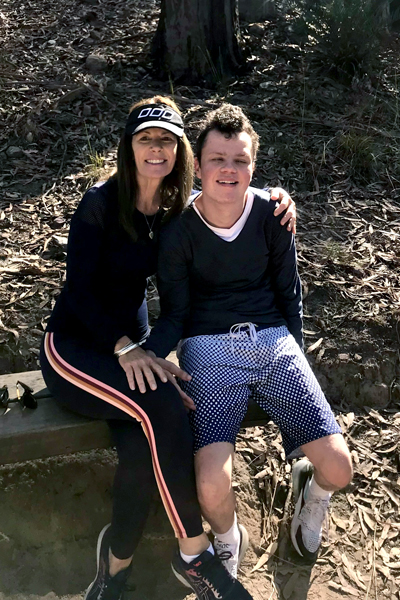Genetic Health Queensland provides long awaited answers

Helen Williams and her son Connor were thrilled to receive a diagnosis for Connor’s condition.
On 28 February each year, Rare Diseases Day aims to raise awareness and generate change for the 300 million people worldwide living with a rare disease.
Connor Penhaligon is one of these people, who at age 21 has finally received a diagnosis for his rare disease thanks to Genetic Health Queensland based at the Royal Brisbane and Women’s Hospital.
Connor has a KAT6A related condition, a rare disease which has only been officially diagnosed in 350 people worldwide. He experiences a range of symptoms including intellectual disability, speech delays, and diminished muscle tone which makes eating, walking, and keeping his eyes open difficult.
Helen Williams, Connor’s mum, said receiving a diagnosis for his condition after 21 years of speculation and guessing was life changing.
“When Connor was born, the doctors knew pretty quickly that something wasn’t quite right. I didn’t want to believe it at first, however after spending countless weeks in hospital with Connor as he battled infections and other issues, I knew they were correct,” Helen said.
“The technology to diagnose Connor’s condition wasn’t advanced enough until recently, so I spent most of his life wondering if I’d done something wrong during pregnancy to cause it. You go through every possibility over and over in your head.
“We’ve been working with the Genetic Health Queensland team since Connor was four years old and were elated to find out there was a finally a test that would reveal Connor’s diagnosis. We found out that his condition is de novo, which means it wasn’t inherited from either parent. It felt like I’d been acquitted of the guilt I’d been carrying all his life – it wasn’t anyone’s fault.
“Despite our challenges, we wouldn’t have it any other way. Connor only has two settings – happy and happier. He’s so easy to love. Our whole family simply adores him.
“I just want to help spread awareness and help other families who may be in a similar position”.
Genetic Health Queensland Director and Clinical Geneticist Professor Julie McGaughran said unfortunately for people like Connor, it’s not uncommon for them to go many years without a diagnosis.
“This is referred to as diagnostic odyssey and means that the families of these children often face an uncertain and unpredictable journey,” Dr McGaughran said.
“Children generally have better access to testing now, but there are many adults who have missed out. Connor was fortunate that his family followed up until we reached a diagnosis, but there are many others have not had the opportunity. It’s important for these families to consider a referral to a clinical genetics service for a contemporary assessment.
“It’s my role as a clinical geneticist to clinically assess patients for a diagnosis, which involves assessing their family tree and any prior investigations the patient has had before ordering the most suitable and comprehensive genetic test available. It’s very important to have a thorough understanding of the patient’s condition to ensure correct interpretation of genetic test results.
“There are a range of benefits to receiving a diagnosis such as having a better idea of what to expect for the future and understanding the chance of other family members or their children having the same condition.”
Metro North Health have partnered with Illumina to offer patients <18-years-old from across Queensland access to whole genomic sequencing via Genetic Health Queensland. Through looking at targeted panels of genes using the latest technology, Queenslanders now have the best chance of finding a rare disease diagnosis. For more information on this and on Genetic Health Queensland, please visit their website.
